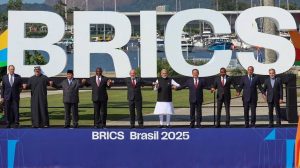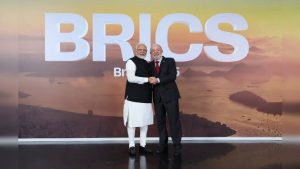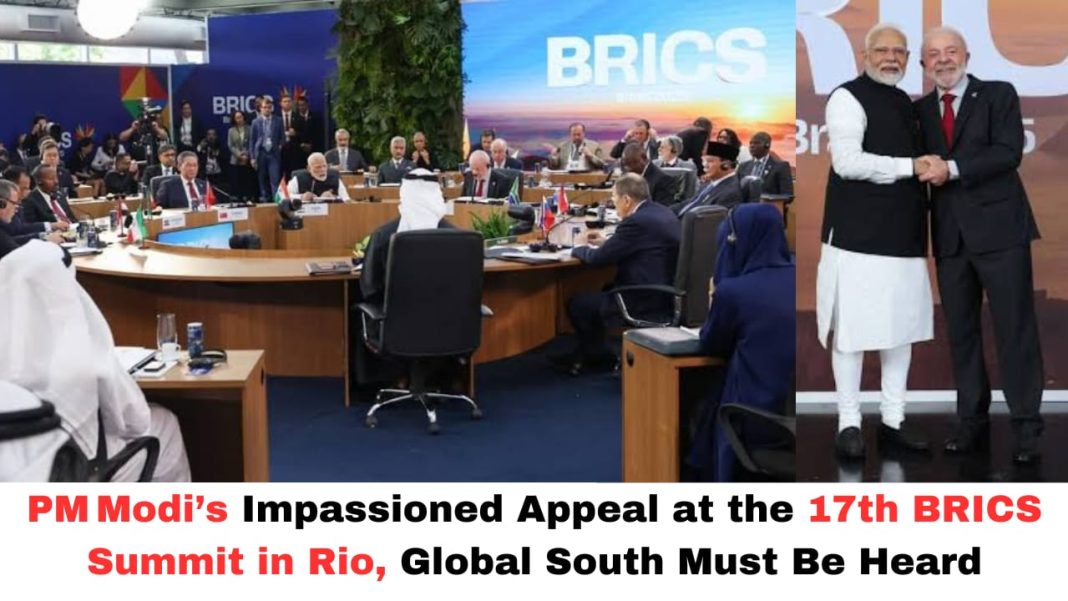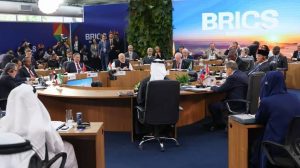Digital News Guru Inter-National Dek:
At the heart of the 17th BRICS Summit, Indian Prime Minister Narendra Modi delivered a powerful and resonant speech on the urgent imperative of overhauling post‑World War II global institutions. His message centered on the inclusion and empowerment of the Global South, which he described as the true bearer of today’s economic and humanitarian mandate.
PM Modi to BRICS: ‘SIM Without Network’ – Global South Must Be Heard
Modi opened with a striking fact — “two‑thirds of humanity” is inadequately represented in institutions constructed in the mid‑20th century.
“Without the Global South, these institutions are like a mobile phone with a SIM card but no network,” he said, underscoring how obsolete governance frameworks disconnect from the very people they claim to serve.

This sentiment was echoed across reports: he criticized entrenched systems whose decisions have historically excluded key voices from emerging economies .
Highlighting Double Standards
Modi issued a scathing critique of the persistent inequities faced by the Global South, labeling the past few decades of promises on development, climate, and technology as mere “token gestures.”
He emphasized:
“The Global South has often been a victim of double standards. On issues like climate finance, sustainable development, and technology access, the Global South has often received nothing but token gestures”.
The summit theme—“Strengthening Global South Cooperation for More Inclusive and Sustainable Governance”—reiterates the host’s goal of amplifying neglected voices in global policymaking.
Demand for Tangible Institutional Reform
Modi drew strong language against “symbolic reforms” and called for deep structural changes in UN Security Council, World Trade Organization, and the multilateral development banks, including voting rights, governance, and leadership reforms.
He captured global attention with a metaphor on obsolescence:
“You can’t run 21st‑century software on 20th‑century typewriters”.
He warned that institutions designed eight decades ago are profoundly mismatched to today’s crises—pandemics, digital threats, climate extremes, economic turmoil.
BRICS Expansion as a Model for Change
Praising BRICS’ recent expansion—Egypt, Ethiopia, Iran, UAE in 2024 and Indonesia in 2025—Modi argued this demonstrated the bloc’s capacity to adapt and grow. He encouraged the same drive in global institutions, stating:
“The expansion of BRICS clearly shows that BRICS is an organization capable of changing itself with the times. Now, we need to show the same resolve for reforms in institutions like the UN Security Council, WTO, and multilateral development banks”
Global Security, Terrorism, and Technological Governance
During the summit’s peace and security session, Modi acknowledged the recent terrorist attack in Pahalgam, condemning it as “an assault on all humanity,” and advocating for zero tolerance and unified action against terrorism.
He stressed the need to eschew “double standards” in counter-terror efforts and urged BRICS countries to cooperate on cyber-security and AI regulation, reflecting India’s rising tech diplomacy agenda.
India’s Diplomacy and Global Leadership
Modi reaffirmed India’s commitment to the wider Global South cause, stating that India will “rise above its own interests” to serve shared humanity.
Amid fervent praise for Brazil’s leadership under President Lula—bringing a “double‑espresso shot” to BRICS—Modi underlined India’s diplomatic ascendancy in the bloc and beyond.
Implications for Global Governance
- Renewed Pressure for Institutional Reform
Modi’s speech intensifies the drive to reform global institutions. The UN Security Council, WTO, and MDBs are likely to face substantial pressure to adjust governance modalities and inclusivity. - BRICS as a Vanguard of Change
With an expanded membership of 11 states accounting for half the world’s population and 40% of global GDP, BRICS is increasingly seen as a credible counterweight to Western-dominated institutions—both structurally and ideologically. - Technological Convergence
Modi’s emphasis on AI, cybersecurity, and tech access signals a shift: BRICS may soon become a key forum for Global South digital governance, pushing for regulatory frameworks and tech-transfer mechanisms. - Security Alignment
India’s stance against terrorism underscores a broader BRICS approach to security—coordinated action and shared norms are expected outcomes, possibly aligning with broader international initiatives like the UN’s Comprehensive Convention on International Terrorism.

Conclusion
At the Rio Summit, PM Modi positioned India—and by extension, the Global South—as pivotal agents of global transformation. His metaphors and reframing of BRICS as a “living laboratory” for institutional reform give the bloc unprecedented moral and strategic weight.
Whether his words translate into actionable change remains to be seen. But for now, BRICS stands at a crossroads: evolve with the Global South’s aspirations or remain relics of a bygone world order.
You May Also Read: Sara Arjun’s First Adult Lead: A High-Stakes Debut in Ranveer Singh’s Dhurandhar









